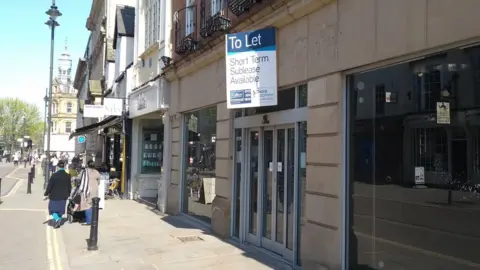Budget 2018: Can Philip Hammond save the High Street?
 BBC
BBC2018 has been an annus horribilis for the High Street.
Big names like Toys R Us and Maplin have gone bust, while others like Debenhams and House of Fraser have closed city and town centre sites.
Thousands of stores have shut, costing tens of thousands of jobs. Cries to save the High Street have become more shrill with every empty unit.
Many retailers have cried foul in the face of a perfect storm. There has been new competition from online firms that employ fewer staff and pay far lower business rates.
There are two ways you can level the playing field. Cut charges for the traditional retailers or increase them for online traders.
Mr Hammond has done a bit of both.
As trailed over the weekend, he has spent £900m knocking a third off the business rates bill of 500,000 small retailers. Very welcome to those who have premises with a rateable value below £51,000.
Second - he unveiled a new £400m digital services tax to be levied on the tech giants (those with revenues over £500m - here's looking at you Facebook and Google) on the money they make on digital services like advertising and streaming entertainment (but not online sales).
So will these two measures save the high street? Probably not - at least not on their own.
While some tenants and landlords welcomed today's move, the business rates discount for small retailers would certainly not have saved any of the high profile retail busts this year.
Rateable values on prominent High Street sites are usually a lot higher than the £51,000 threshold. Industry body the British Retail Consortium was underwhelmed.
Chief executive Helen Dickinson said: "Rather than tinkering around the edges, struggling high streets require wholesale reform of business rates in order to thrive. The issue remains that the business rates burden is simply too high."
More aggressive
The tax on digital services is a bold step at first sight - going it alone in taxing the very same companies that the UK is trying to woo to invest in the UK.
However, it's possible - even likely - that this digital tax will never see the light of day. Its introduction is delayed until 2020 - by which time the OECD group of countries has promised to come up with its own plans to tax the digital economy.
The chancellor explicitly said he reserved the right to adopt their proposals if they look like gaining international acceptance. So, while he looks like a trailblazer, he would prefer safety in numbers.
That's not to say that the rest of the world isn't serious about figuring out how to tax technology companies - they are, and their proposals may be more aggressive than Philip Hammond's.
But it's unlikely that the measures in today's Budget are enough for him to be considered as the saviour of the High Street.
